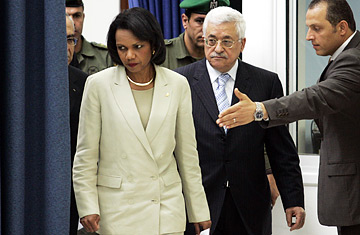
U.S. Secretary of State Condoleezza Rice and Palestinian Authority President Mahmoud Abbas arrive for a joint press conference at Abbas's headquarters in the West Bank city of Ramallah, August 2, 2007.
It is becoming something of a tradition for U.S. Presidents, during their waning months in office, to seal their legacy by trying to solve the Arab-Israeli conflict. That's the purpose of President George W. Bush's sending Secretary of State Condoleezza Rice on a four-day swing through the Middle East, ending up, as usual, in the holy city of Jerusalem, which remains the key to many of the region's unsolved quarrels. But the President's attempt to succeed where Bill Clinton failed looks likely to achieve, at best, mixed results.
The stony political landscape has changed, for the worse, since Rice made her last pilgrimage here five months ago. For one thing, the Islamist militants of Hamas now control the Gaza Strip, having chased away the armed forces of Palestinian President Mahmoud Abbas — a man heartily championed by the White House, although less so by the Israelis, and openly despised by most Palestinians who see him as a puppet made to dance by the U.S. and the Israelis.
On the bright side, the Saudis told Rice that they might be willing to attend a U.S.-sponsored summit this fall between Israel and so-called "moderate" Arab leaders. Jordan, Egypt, Bahrain and Morocco may also be invited. Saudi participation in talks with the State of Israel, which Riyadh has yet to recognize, would certainly mark a diplomatic breakthrough. But the Saudis made clear that they will show up only if the summit is aimed at discussing the "core issues" that stand in the way of a settlement. Saudi Foreign Minister Saud al-Faisal described these issues as the creation of a functioning Palestinian state with east Jerusalem as its capital, withdrawal of Jewish settlements from the West Bank, and the right of return for Palestinian refugees.
Israeli officials are intrigued by the Saudis' overture, but they offered no promises in return — and have made no secret of their reluctance to discuss the most contentious issues at this stage. That doesn't bode well for Bush's summit. Privately, one minister's aide described Rice's trip as "about as useful as grinding dust," but he said that Prime Minister Ehud Olmert's government had to go through the motions of complying with Washington. Politically, Olmert is too weak to be starting closing down the West Bank settlements that house around 250,000 Israelis. Also, Israelis doubt that Abbas, especially after his defeat in Gaza, can deliver on promises to curb attacks on Israel from inside the Palestinian territories. In response to U.S. prodding, Israel helped Abbas by releasing around $200 million in frozen tax revenues and setting free 250 Palestinian prisoners. But these concessions, as one Israeli intelligence official told TIME, "won't necessarily win Abbas any friends among the Palestinians, but they'll keep him from drowning."
Abbas's team also expressed frustration at what they described as Rice's failure to nail down Israeli promises to lift roadblocks inside the Palestinian territories (so far, the Israeli military has refused) and halt illegal Jewish settlements. "Rice doesn't get into specifics," complained one Palestinian negotiator. "She's like a priest in church telling us what God likes or doesn't like."
Abbas did get one boost from Rice: the promise of $80 million in non-lethal aid to improve the training and capability of his feckless security forces. Sources close to the negotiations said this aid would be used for "law and order on the streets" and not for an eventual showdown between Abbas' forces and Hamas. But throwing money and bullet-proof vests at Abbas' security forces may not help Abbas overcome his most dangerous weakness — the loyalty of his men is doubtful. Abbas has yet to get rid of his officers who fled Gaza, leaving their troops behind. Efforts to bolster his forces through recruitment are also struggling. One well-placed Palestinian in Amman told TIME that Abbas was rebuffed by Palestinian commanders when he sought to bring the 2,500-strong Jordan-based Badr force to the West Bank to shore up his own militia against Hamas.
While everybody on Rice's itinerary is welcoming the White House initiative to revive peace talks, unless she is able to bridge the vast gulf between their positions on what needs to be negotiated right now, the planned peace conference in the fall may amount to little more than a photo opportunity.
—With reporting by Jamil Hamad/Bethlehem and Aaron J. Klein/Tel Aviv